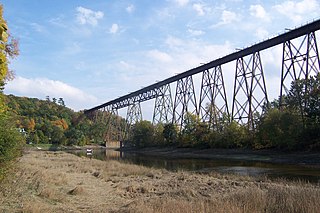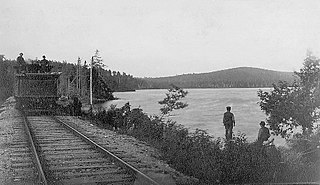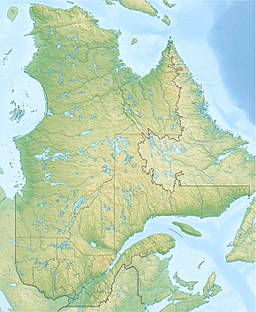
The Jacques-Cartier River is a river in the province of Quebec, Canada. It is 161 km long and its source is Jacques-Cartier Lake in Laurentides Wildlife Reserve, and flows in a predominantly southern direction before ending in the Saint Lawrence River at Donnacona, about 30 km upstream from Quebec City.

Fossambault-sur-le-Lac is a city in the south part of Quebec, Canada, in La Jacques-Cartier Regional County Municipality, just north of Quebec City. It had a population of 2,327 as of the Canada 2021 Census. It is located near Saint-Joseph Lake.
The Batiscan Lake is located in Upper Batiscanie and is the limit of unorganized territories of Lac-Blanc and Lac-Croche. This territory is related to the La Jacques-Cartier Regional County Municipality, in the administrative region of the Capitale-Nationale, in the province of Quebec, Canada.

The Cap-Rouge river is a river flowing on the north shore of the Saint-Laurent river at the height of the Sainte-Foy–Sillery–Cap-Rouge borough of Quebec City and in the city of Saint-Augustin-de-Desmaures, both cities in the administrative region of Capitale-Nationale, in the province of Quebec, Canada.
The Jacques-Cartier South River is a tributary of the rivière Jacques-Cartier Nord-Ouest, located in the unorganized territory of Lac-Jacques-Cartier, in the La Côte-de-Beaupré Regional County Municipality, in the administrative region of Capitale-Nationale, in Quebec, Canada. The course of the river passes in particular in the Jacques-Cartier National Park. The head water is Petit lac Jacques-Cartier.
The Rocheuse river is a tributary of the rivière du Malin, located in the unorganized territory of Lac-Jacques-Cartier, in the La Côte-de-Beaupré Regional County Municipality, in the administrative region of Capitale-Nationale, in Quebec, Canada. The course of the river passes in particular in the Laurentides Wildlife Reserve.

The Sautauriski River is a tributary of the Jacques-Cartier River, flowing in the administrative region of Capitale-Nationale, in Quebec, Canada. This watercourse subsequently crosses:
The Rivière Ontaritzi is a tributary of the Jacques-Cartier River, flowing in the municipality of Sainte-Catherine-de-la-Jacques-Cartier, in the La Jacques-Cartier Regional County Municipality, in the administrative region of Capitale-Nationale, in Quebec, Canada.

The Rivière aux Pins is a watercourse flowing in several municipalities of La Jacques-Cartier Regional County Municipality, in the administrative region of Capitale-Nationale, in Quebec, in Canada. The municipalities crossed by this 32.7 kilometres (20.3 mi) river, are Saint-Gabriel-de-Valcartier (18.9 km), Shannon (11,0 km) and Fossambault-sur-le-Lac (2.8 km).

The Station touristique Duchesnay, formerly known as the “Sanctuaire de Duchesnay”, is a resort park located on the edge of Saint-Joseph Lake, in the La Jacques-Cartier Regional County Municipality, in the administrative region of Capitale-Nationale, in Quebec (Canada). The territory of this station extends over several municipalities: Lac-Saint-Joseph, Sainte-Catherine-de-la-Jacques-Cartier, Lac-Sergent and Saint-Raymond (north). Duchesnay is operated by Société des établissements de plein air du Québec (SÉPAQ).

Lake Sergent is a freshwater body located in the municipality of Lac-Sergent, in the Portneuf Regional County Municipality, in the administrative region of Capitale-Nationale, in Quebec, in Canada.
The Rivière de la Somme is a watercourse flowing in the municipalities of Saint-Gabriel-de-Valcartier and Shannon, in the La Jacques-Cartier Regional County Municipality, in the administrative region of Capitale-Nationale, in Quebec, in Canada.
The Rivière Chézine is a tributary of the Sainte-Anne River flowing in the unorganized territory of Lac-Croche and the municipality of Saint-Gabriel-de-Valcartier, in the La Jacques-Cartier Regional County Municipality, in the administrative region of Capitale-Nationale, in Quebec, in Canada.
The Rivière aux Pins is a tributary of the Montmorency River, which is a tributary of the north shore of the St. Lawrence River, flowing in Sainte-Brigitte-de-Laval, in the La Jacques-Cartier Regional County Municipality, in the administrative region of Capitale-Nationale, in the province of Quebec, in Canada.
The Petite rivière aux Pins is a tributary of the Rivière aux Pins, flowing entirely in the territory of Saint-Gabriel-de-Valcartier, in the La Jacques-Cartier Regional County Municipality, in the administrative region of Capitale-Nationale, in Quebec, in Canada.
The lac Savane is a body of fresh water located northeast of the city of Quebec, in the administrative region of Capitale-Nationale, in the province of Quebec, in Canada. This body of water straddles the regional county municipalities of:
The rivière du Mont Saint-Étienne is a tributary of the Sainte-Anne river, flowing on the north bank of the Saint Lawrence River, in the unorganized territory of Lac-Jacques-Cartier and the municipality of Saint-Ferréol-les-Neiges, in the La Côte-de-Beaupré Regional County Municipality, in the administrative region of Capitale-Nationale, in the province of Quebec, in Canada.
The Rivière des Roches is a tributary of the west bank of the Sainte-Anne River, on the north bank of the Saint Lawrence River. This river flows in the unorganized territory of Lac-Jacques-Cartier and in the municipality of Saint-Ferréol-les-Neiges, in the La Côte-de-Beaupré Regional County Municipality, in the administrative region of Capitale-Nationale, in the province of Quebec, in Canada.
The Rivière Brûlé is a tributary of the Sainte-Anne River, flowing on the north bank of the Saint Lawrence River, in the non-territory organized from Lac-Jacques-Cartier, in the La Côte-de-Beaupré Regional County Municipality, in the administrative region of Capitale-Nationale, in the province of Quebec, in Canada.

The rivière du Sud is a tributary of the south shore of the Saint Lawrence River. This watercourse flows in the municipalities of Notre-Dame-du-Rosaire, Sainte-Euphémie-sur-Rivière-du-Sud, Armagh, Saint-Raphaël, Saint-François-de-la-Rivière-du-Sud, Saint-Pierre-de-la-Rivière-du-Sud and Montmagny, in the Montmagny Regional County Municipality, in the administrative region of Chaudière-Appalaches, in the province of Quebec, in Canada.










